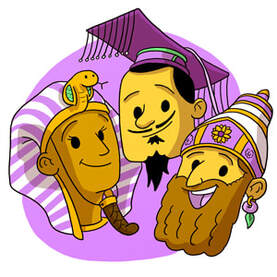Drawing History began in 2018 as an initiative by illustrator Ron Schuijt from the Netherlands. It started as a side project to combine his love for history with his desire to create comics. The goal was to create something that was accessible for as many people as possible, without making it feel catered to schoolchildren.
GoalLearning about history is a powerful tool to develop a person's understanding of the world. But the telling of history is often victim to reshaping thanks to political agendas, forced narratives or institutional bias. As an independent creator, I strive to tell History with as few preconceptions as possible. Completely free of personal preferences would be impossible with a subject of this size, but I will try to approach our history as fair as possible.
Another focus is the interconnectivity of human existence. The reason why I focussed on world history instead of, for example, national history, is because I’m intrigued by the bigger picture. Our history and our progress is a journey done by the whole of humankind. Cultures, nations and people interacted and influenced each other earlier and more often than a lot of us realize. |
Sources
I’m not an academic, and I don’t strive to reach an academic level of answerability. The main source for this comic is Wikipedia, and the level of detail reflects this. Wikipedia is often supplemented by other trusted websites like www.britannica.com or www.ancient.eu. Any information outside of these reliable sources are subject to critical inspection.
But how reliable is Wikipedia you might ask? A 2005 study in the journal Nature found that the information provided on Wikipedia is almost as reliable as that of the benchmark, Encyclopedia Britannica. A 2008 study in the journal Reference Services Review pegged Wikipedia's accuracy rate at 80 percent compared to 95-96 percent among other sources. It must be taken into account that this accuracy rate is among all of Wikipedia's articles, not only about historical topics. The articles surrounding the topics I use, often have a good number of sources and footnotes. Articles that lack sufficient sources, are handled carefully.
But how reliable is Wikipedia you might ask? A 2005 study in the journal Nature found that the information provided on Wikipedia is almost as reliable as that of the benchmark, Encyclopedia Britannica. A 2008 study in the journal Reference Services Review pegged Wikipedia's accuracy rate at 80 percent compared to 95-96 percent among other sources. It must be taken into account that this accuracy rate is among all of Wikipedia's articles, not only about historical topics. The articles surrounding the topics I use, often have a good number of sources and footnotes. Articles that lack sufficient sources, are handled carefully.
Feedback
If you read something that was incorrect or incomplete, don’t hesitate to let me know! The beauty of online comics is that edits are always possible. The credibility of the comic is a top priority, so any remarks that can improve the quality and integrity of the comic is more than welcome.



